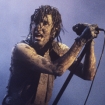Revolver has teamed with Jerry Cantrell for a deluxe collector's bundle featuring a hand-numbered slipcase, alternate cover, exclusive glow-in-the-dark shirt, colored vinyl and more. It's limited to 200 — order yours now!
Jerry Cantrell is a hard rocker who is meticulous about his music-making. Songwriting has mattered to him since he got his first listen to Elton John, Fleetwood Mac and KISS as a child of the 1970s, playing air-guitar to his favorite tunes then just as he still does today. So, when the Alice in Chains singer-guitar-hero began preparing to record Brighten, his first solo album in 19 years, he took his time before ever stepping into a studio.
The result is a collection of nine songs of darkness and light crafted to reflect the hard-edged sound he's perfected since forming Alice more than three decades ago, while also stretching out in new directions on both acoustic and electric guitars. He made it with the help of Guns N' Roses bassist Duff McKagan, former Dillinger Escape Plan singer Greg Puciato and a tight-knit group of journeyman players and producers.
In these outtakes from Revolver's new Winter 2021 Issue cover story on Cantrell's legacy with Alice in Chains and the making of Brighten, he expands on the music that inspired him as a child and what fueled him as a young guitarist preparing (unknowingly) to help lead a Nineties grunge revolution. And he talks about the hard work of record-making.
The music that first inspired him
"I was born in the Seventies and I'm a child of the Seventies. Elton was larger than life in the Seventies. Him and KISS, AC/DC and Fleetwood Mac at the time. We're all a collection of everything that pours in our ear holes and comes out of our fingertips. It's cool to be part of that cycle."
How the original 1971 recording of Elton John's "Goodbye" inspired Cantrell to record his own version for Brighten
"Listen to how much emotion and drama is in a minute-and-46-seconds song. That's what turned me on to music when I was a kid. And the first artist that I had that connection with was Elton John. That's when the lights went on, like, 'Oh, my God.' That's when I saw a little movies in my head.
"I made that connection at a very early age, and I have wanted to be somebody that could create emotions like that. I listened to ["Goodbye"] and I am moved by that. Doesn't matter if that's me or Elton's version. It's perfect songwriting, production and execution."
The moment he realized he wanted to play music
"I remember being a kid and how magical music was to me and the connection I made to artists. I just fell in love with it. I was just like, that is so fucking cool. You can like write songs and fucking play them for people and that's a job! I mean, like, really? I want to do that."
The forward-leaning music that came before the Seattle grunge explosion
"We were part of a much bigger worldwide wave of stuff that started happening in the late Eighties. There were a lot of bands that were cool as shit: Jane's Addiction, Ministry, Depeche Mode, Bauhaus, Red Hot Chili Peppers, Metallica. There was a lot of really great stuff starting to percolate out there. You could feel a change was on the horizon."
The feeling in Seattle leading up to the arrival of Alice in Chains, Nirvana and Soundgarden into the mainstream
"It was some sort of movement, but it wasn't really planned. It just fucking happened, and you knew it was real. You knew you were a part of it. We all had our little gangs: the Soundgarden gang, the Mother Love Bone gang, the Alice gang. And we all got along. There's a little extra bit of pride that it happened in your hometown. I grew up 30 miles south of where that happened. It's where I was born."
The milestone of making 1992's multiplatinum Dirt with Alice in Chains
"We all got to walk out of that record thinking we did the best record we could make. We did that most of the time. We were having fun, doing what we always wanted to do, got a fucking record contract, we're making records. We're touring, we're opening up for our heroes and shit. Pretty bad ass. And we had some early big success."
Being an introverted artist playing to big crowds
"Most artists are really introverted people. And then they get on a stage and look out at 20,000 people. It's a weird dichotomy, but there's something really triumphant about it. Nothing like that feeling, man. And it happens every time I get on a stage: fucking butterflies."
When to deliver a big guitar solo on a new song
"A lot of stuff doesn't need a big solo. I'm always more interested in the song. Solos to me have always been like a vocal part anyway."
Making records now with decades of experience
"It's a mix of confidence and [the experience of] what you've done. There's also that uncertain-ness, and that's the danger of rock & roll. It's the danger of a train wreck or a car crash at any moment. That's absolutely essential. It shouldn't work. It shouldn't last. It should blow up the moment sunlight hits it, just burst into fucking flames, but it doesn't."
The hard work of writing and demoing before recording
"I'm the guy where everybody's out partying and I'm still in the rehearsal room with the Dr. Rhythm Drum Machine and a Tascam [recorder] for eight hours. That was always me. I was the guy in the basement still demoing when the guys were doing other shit."
Why he often writes on an acoustic guitar before "scaling up" to electric
"For song structure, [playing on acoustic] is a really good indicator if you've got a good idea or not. We've done tours where it's just like MTV Unplugged — where you can't hide, man. That's where it really reveals the structure of a song. If it works on that level, it's gonna work scaled up.
"Acoustic guitar is a really great texture. It's percussive. I remember listening to a couple of interviews with Keith Richards about how important the acoustic is underneath the rock guitar in the Stones. For a lot of the music that I grew up on, that was the real backbone."
The meaning of his lyrics
"I always struggle having to explain something after the fact. I mean, I put it best in lyrics, and in the song. I love writing. I love film. I love books. I love art. I love anything that, that like, 'Holy shit, OK, this is going to take a few listens, this is going to take a few watches.' And I still might not know exactly what the fuck is going on, but that's where you make your personal connection to it."
The importance of taking his time writing words to his songs
"That's the part that takes me the longest. You can fuck up a really good tune by not matching the intensity and the emotion of lyrics with the music. You want the lyrics to go with that music.
"I'm pretty good at staying with it until I get something. Most of the time I'm pretty satisfied with it, but it's the last thing and it's so important to say what you want to say and in a way that's not so spelled out. You should leave it open enough to be interpreted, leaving some things open to question. If it evokes a response, if it makes you think, if it makes you feel, then I've done my job."












